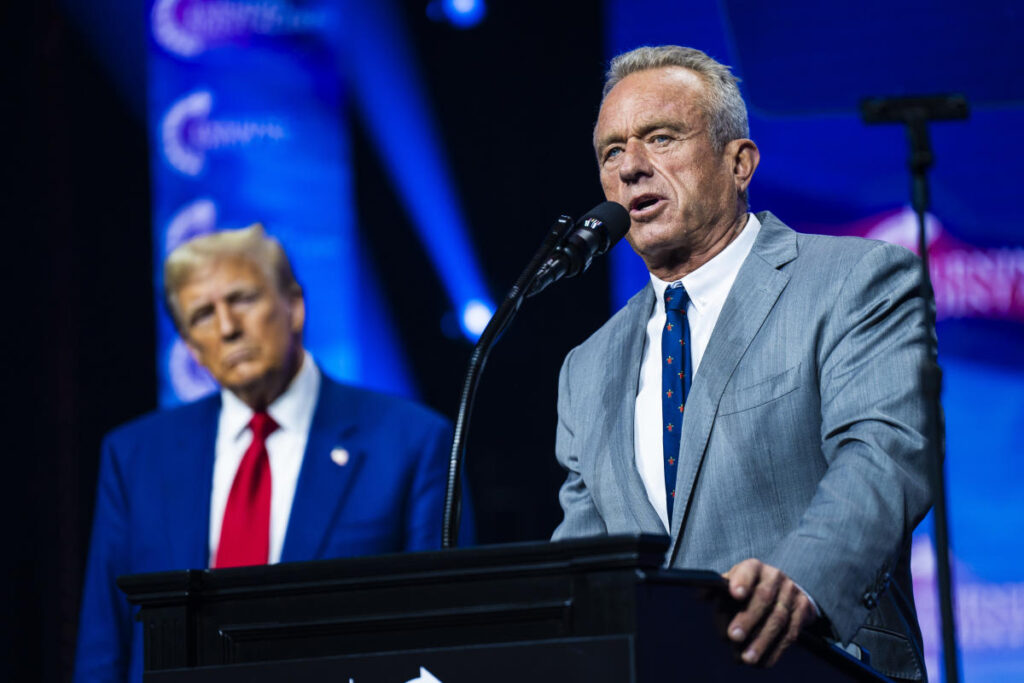In a notable dinner gathering at Mar-a-Lago, President-elect Donald Trump orchestrated a meeting between his nominated Health and Human Services secretary, Robert F. Kennedy Jr., and pharmaceutical executives from major companies like Pfizer and Eli Lilly. This event was marked by a surprising shift in tone from Kennedy, a longtime critic of the pharmaceutical industry. Initially convened in a formal dining room, the meeting eventually relocated to a relaxed patio setting infused with music. During the dinner, conversations regarding high prescription drug costs took center stage, with Trump expressing a desire to support drug manufacturers. The dinner’s atmosphere was reported to be warm, which some participants found unexpected given the complex relationships Kennedy has had with the pharmaceutical sector throughout his career.
The dialogue steered towards the role pharmacy benefit managers play in rising drug prices, a topic that has become a focal point of lobbying among drug companies. Trump emphasized the importance of evaluating U.S.-based pharmaceutical manufacturing, signaling potential alignment with the industry’s interests. Notably, the topic of vaccines arose, where Kennedy raised concerns about the existing vaccine study protocols and the evolving rates of chronic diseases. Despite Kennedy’s historical skepticism toward vaccinations, participants indicated that Trump backed Kennedy’s call for further research. The dinner, characterized as “a little unusual” by Trump, fostered discussions that seemed to bridge divides, igniting speculation on how deep the emerging cooperation might extend amid previous antagonisms.
Kennedy’s nomination presents an intriguing challenge as he prepares for meetings with Republican senators. While his history as a vocal critic of the industry and advocate for vaccine research has led to concerns, particularly from Democrats, some in the Trump camp believe Kennedy’s fears are overstated. Despite some Republican senators questioning his stances on vaccines, many think he could maintain a pragmatic stance due to Trump’s strong relationship with the anti-abortion community, potentially countering skepticism regarding Kennedy’s positions on multiple issues. Kennedy leads a contentious landscape as he combines pro-choice beliefs and a critical stance towards vaccine propagation in a constantly changing political arena.
Health advocacy groups that lean left remain organized for potential pushback against Kennedy’s confirmation, citing concerns stemming from his previous statements about abortion and vaccines. Organizations such as Protect Our Care have readied campaigns to hinder Kennedy’s nomination, stressing the need for Republicans to consider his history seriously. With Kennedy’s nomination requiring bipartisan support in an increasingly polarized environment, he cannot afford to lose the backing of more than three Republican senators. The intersection between Kennedy’s vaccine skepticism and the established norms around public health policy will be closely scrutinized.
Kennedy’s long-term involvement in the realm of public health, particularly through his advocacy against certain vaccinations, brings a uniquely contentious perspective to the role of HHS Secretary. His assertions of a “mass poisoning” by drug companies and challenges to the pharmaceutical establishment pose questions about the potential for sweeping reforms. However, these declarations are met with skepticism from the scientific community, who argue against the credibility of his claims. As representative figures within the pharmaceutical sector express concerns regarding the implications of Kennedy’s confirmation, they also recognize a window of opportunity to address longstanding grievances against intermediary pharmacy benefit managers, which they believe is justified at the policy level.
In conjunction with Kennedy’s potential nominations, it is imperative to observe how the dynamics around pharmaceutical reform may evolve. Trump’s endorsement of Kennedy appears to reflect a desire to challenge powerful interests while navigating the intricacies of public health policy. Moreover, as both Trump and Kennedy anticipate adjustments in their approach to vaccine mandates and drug pricing, the outcome of their collaboration may yield a substantial impact on the future of health care in the United States. Ultimately, decisions made now could set foundational shifts within health policy discourse, affecting everything from vaccine research protocols to the regulation of pharmaceutical supply chains and beyond.

